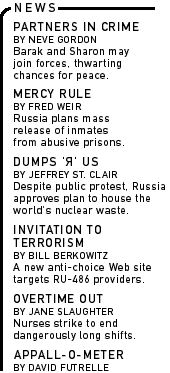

|

|

|

|
| |
|
|
|
"After their 14th or 15th hour on the job, nurses are questioning their judgment," says Mary Robinson, a nurse for 30 years. Robinson is one of 600 nurses in Flint who've been on strike since November 8 against mandatory overtime. The strikers say that at McLaren Regional Medical Center, Flint's premier hospital, it's not unusual for management to schedule RNs for 16-hour days. Robinson, for example, works 3 p.m. to 11:30 p.m. in the recovery room but may have to stay another eight hours. "We can then be expected to be back the next day at 3 p.m.," she says. At New York's Nyack Hospital, nurses walked the picket line for 151 days last winter. RN Mary Louise Cahill says that when a nurse filed a grievance for being forced to work two shifts in a row, "they told her every time she came to work, she should be prepared to stay." The Flint and Nyack strikes are part of a wave of resistance to the long hours that
In Massachusetts, the Board of Registration in Nursing has issued
an advisory that refusal to work overtime will not be considered
"patient abandonment"-- The American Nurses Association (ANA) has issued a consumer alert about hospitals' growing tendency to use mandatory overtime as a normal staffing mechanism. It's part of the "lean workplace" creed: Management tries to match staffing levels to a fluctuating patient census. Paying overtime is cheaper than hiring more staff because of the cost of benefits. Suzanne Gordon, co-author of From Silence to Voice: What Nurses Know and Must Communicate to the Public, says that nurses are working harder every hour they're on the floor. Because insurance companies and HMOs have cut back on reimbursements, patient stays are shorter and patients' needs are more acute. With shorter stays, a unit may experience a 40 percent patient turnover in 24 hours--and the work is front-loaded for each stay. "It's not that management is saying to a nurse with four patients 'you have to work 12 hours,' " Gordon says. "It's a nurse with 14 patients."
News Flash Update:
|


